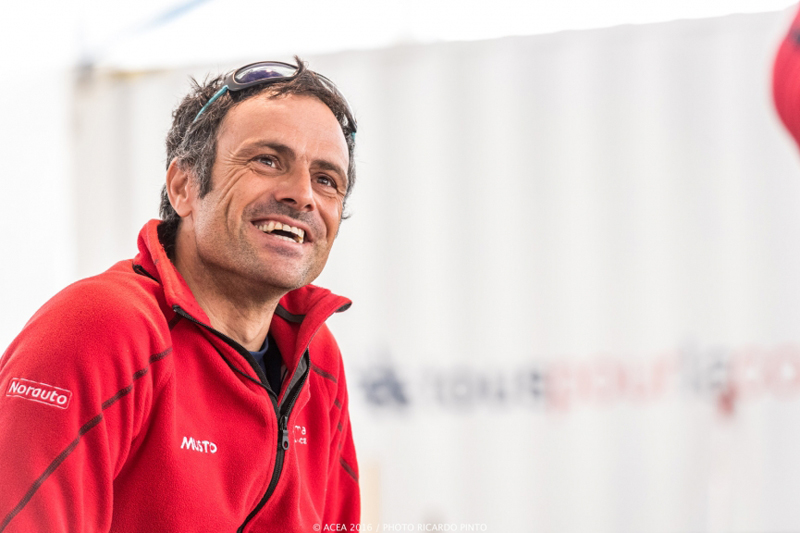Cammas: “Sailing Has Always Been My Passion”
“I had a nickname when I worked with Luna Rossa – it was ‘Napoleon’”
There can be only one Skipper in the 35th America’s Cup whose nickname could be ‘Napoleon’ and that is the man leading the French challenge for the ‘Auld Mug’, Franck Cammas.
Now firmly ensconced in their base in Bermuda, to where Groupama Team France have now relocated from their previous home in France, Franck and the team he leads are firmly focused on being the first French outfit to win the oldest trophy in international sport.
In a recent interview which can be watched below, Franck gave some insights into what makes him tick, as a Skipper and a sailor, what the ambitions are for the French team in the America’s Cup in Bermuda, and how he has transitioned from record winning offshore campaigner to the challenges of the America’s Cup in its revolutionary guise in 2017.
“Sailing has always been my passion,” said one of France’s most decorated sailors as he explains where his sailing roots lie, “and it’s true that there are different ways to sail.
“There’s ocean sailing, sailing with a crew, solo sailing, monohull and multihull, and that’s what’s so interesting in my sport, you can be challenged in totally different ways. And of course once you’ve been successful in overcoming one challenge, you’re motivated by trying to overcome the next.
“The America’s Cup has always been, in the sailing world, the competition that has attracted the greatest teams and the best engineers. It’s not ocean sailing, but the approach is somewhat similar.
“And, just as it is for all sportsmen, the appeal is in testing yourself at the highest level and surrounding yourself with the best of the best, to push yourself to the limits and to learn in order to develop your own talent. And with the America’s Cup, the stakes are really high for sailors and for the whole team.
“I’ve always been drawn by building boats, developing boats with designers, and really understanding how a boat works, talking with them so that they can understand how you operate the boat and how things work in real scenarios.
“In ocean sailing particularly, there aren’t many designers who have actually raced and who understand the limits to which you can push the boat, so as a sailor you have to keep communicating that back.
“And it’s the same for the America’s Cup. In foiling boats where instability is a constant, and where crew members have to manage this constant instability, you have to really understand the fine detail of that specific element that you can tweak so that – in collaboration with the designers, the sailors can hit that sweet spot.
“I do like to stretch myself when I do an activity, for sure. When I do something, it’s generally because I’m passionate about it and excited to do it. When I go into the mountains or I practise a sport, I like to understand the limits – whether they’re physical or mental. Yeah, so I like doing other things than sailing.
“My mindset is that I like to discover new things, I don’t necessarily like to follow the well-trodden paths, which everybody knows already. Discovery and adventure – and when I say adventure, I’m not necessarily referring to a round-the-world race. It can be a technical adventure, or a human adventure with a great team. The America’s Cup is for sure an adventure. It’s not the same kind of adventure as the Vendee Globe, but it’s a great adventure.”
Adventure is clearly at the root of what motivates the man his Luna Rossa colleagues called ‘Napoleon’, but he is realistic about what can be achieved by Groupama Team France in Bermuda in 2017 saying, “Well we’re not the favorites – that’s clear. We’re outliers, “underdogs” as you say. But the French have always been strong when in that situation. Look at rugby! When we’re favorites there we never win a match and when we’re not, we win!
“I feel that during these past months and years, we’ve really learned a tremendous amount as a team – whether it be about management, about strategy, about the structure and background of the America’s Cup. It’s really a unique environment, especially for a French team. So we have to learn all that, then mastermind a way, at the end of the day, to win the race.
Franck turned to what it’s taken to switch from trans-ocean specialist to inshore racing master, explaining that “it’s a fact that this is different, in terms of physical preparation – it’s very different, although for the Volvo Ocean Race, say, getting prepared physically was an important factor. Of course, however, the kind of effort required for an America’s Cup race is not at all the same. For that, it’s 20 minutes of intense physical effort at extremely high heart rates for the grinders.
“Physical preparation is a factor that can really impact performance, given that it’s the energy generated by the grinders that enables us to get the boats to foil steadily. So we’re really dependent on that, whereas for ocean racing, if you don’t have more physical strength than the other sailors, if you’re not quite as physically strong as others, you might perhaps find different ways to handle the boat, or you might take a bit more time. But the outcome of the race won’t be quite as dependent on physical strength.
“So for the America’s Cup – and this is the case for all the other technical details – you have to be on point when it comes to getting ready physically, and you have to get those key performance metrics from each crew member.”




You know…in these 50 days leading up to the AC, I am reminded of how crass the sailing event can be. Let’s not forget that some teams pulled out because SOME didn’t play by the rules…